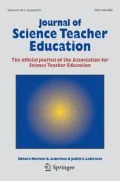Abstract
We describe a model professional development intervention currently being implemented to support 3rd- through 5th-grade teachers’ science instruction in 9 urban elementary schools with high numbers of English language learners. The intervention consists of curriculum materials for students and teachers, as well as teacher workshops throughout the school year. The curriculum materials and workshops are designed to complement and reinforce each other in improving teachers’ knowledge, beliefs, and practices in science instruction and English language development for ELL students. In addition to these primary goals, secondary goals of the intervention included supporting mathematical understanding, improving scientific reasoning, capitalizing on students’ home language and culture, and preparing students for high-stakes science testing and accountability through hands-on, inquiry-based learning experiences.
Similar content being viewed by others

References
Abedi, J. (2004). The No Child Left Behind Act and English language learners: Assessment and accountability issues. Educational Researcher, 33(1), 4–14.
Aikenhead, G. S. (1997). Toward a First Nations cross-cultural science and technology curriculum. Science Education, 81, 217–238.
Amaral, O. M., Garrison, L., & Klentschy, M. (2002). Helping English learners increase achievement through inquiry-based science instruction. Bilingual Research Journal, 26, 213–239.
August, D., & Hakuta, K. (Eds.). (1997). Improving schooling for language-minority children: A research agenda. Washington, DC: National Academy Press.
Ballenger, C., & Rosebery, A. S. (2003). What counts as teacher research? Investigating the scientific and mathematical ideas of children from culturally diverse backgrounds. Teachers College Record, 105, 297–314.
Bryan, L. A., & Atwater, M. M. (2002). Teacher beliefs and cultural models: A challenge for science teacher preparation programs. Science Education, 86, 821–839.
Buxton, C. (2006). Creating contextually authentic science education in a “low performing” urban elementary school context. Journal of Research in Science Teaching. 43, 695–721.
Buxton, C., Lee, O., Mahotiere, M., & Secada, W. (2007). Bringing culture in through the back door: Third-grade teachers analyze English language learners’ reasoning about measurement. Paper presented at the annual meeting of the American Educational Research Association, Chicago.
Elmore, R. (1996). Getting to scale with good educational practice. Harvard Educational Review, 66(1), 1–26.
Florida Department of Education. (1996). Florida curriculum frameworks (Sunshine Standards). Tallahassee: Author.
Florida Department of Education. (2002). FCAT test item specifications. Tallahassee: Author.
Garcia, E. E., & Rodriguez, J. (2000). The education of limited English proficient students in California schools. Bilingual Research Journal, 24(1–3), 15–35.
Hampton, E., & Rodriguez, R. (2001). Inquiry science in bilingual classrooms. Bilingual Research Journal, 25, 461–478.
Hart, J., & Lee, O. (2003). Teacher professional development to improve science and literacy achievement of English language learners. Bilingual Research Journal, 27, 475–501.
Kennedy, M. M. (1998). Education reform and subject matter knowledge. Journal of Research and Science Teaching, 35, 249–263.
Lee, O. (2002). Science inquiry for elementary students from diverse backgrounds. In W. G. Secada (Eds.), Review of Research in Education (Vol. 26, pp. 23–69). Washington, DC: American Educational Research Association.
Lee, O. (2004). Teacher change in beliefs and practices in science and literacy instruction with English language learners. Journal of Research in Science Teaching, 41, 65–93.
Lee, O., & Fradd, S. H. (1998). Science for all, including students from non-English language backgrounds. Educational Researcher, 27(3), 12–21.
Lee, O., & Luykx, A. (2005). Dilemmas in scaling up innovations in science instruction with nonmainstream elementary students. American Educational Research Journal, 42, 411–438.
Lee, O., & Luykx, A. (2006). Science education and student diversity: Synthesis and research agenda. New York: Cambridge University Press.
Lee, O., Luykx, A., Buxton, C., & Shaver, A. (2007). The challenge of altering elementary school teachers’ beliefs and practices regarding linguistic and cultural diversity in science education. Journal of Research in Science Teaching, 44, 1269–1291.
Lee, O., Maerten-Rivera, J., Buxton, C., Penfield, R. D., & Secada, W. G. (in press). Urban elementary school teachers’ perceived knowledge, practices, and organizational supports and barriers in Science instruction with English language learners. Journal of Science Teacher Education.
Loucks-Horsley, S., Hewson, P. W., Love, N., & Stiles, K. E. (1998). Designing professional development for teachers of science and mathematics. Thousand Oaks, CA: Corwin Press.
McNeil, L. M. (2000). Creating new inequalities: Contradictions of reform. Phi Delta Kappan, 81, 729–734.
National Center for Education Statistics. (1999). Teacher quality: A report on the preparation and qualifications of public school teachers. Washington, DC: U.S. Department of Education, Office of Educational Research and Improvement.
National Council of Teachers of Mathematics. (2000). Principles and standards for school mathematics. Reston, VA: Author.
National Research Council. (1996). National science education standards. Washington, DC: National Academy Press.
Rodríguez, A., & Kitchen, R. S. (Eds.). (2005). Preparing prospective mathematics and science teachers to teach for diversity: Promising strategies for transformative action. Mahwah, NJ: Erlbaum.
Spillane, J. P., Diamond, J. B., Walker, L. J., Halverson, R., & Jita, L. (2001). Urban school leadership for elementary science instruction: Identifying and activating resources in an undervalued school subject. Journal of Research in Science Teaching, 38, 918–940.
Wiley, T. G., & Wright, W. E. (2004). Against the undertow: Language-minority education policy and politics in the “age of accountability.” Educational Policy, 18, 142–168.
Acknowledgements
This work is supported by the National Science Foundation (NSF Grant #ESI–0353331). Any opinions, findings, conclusions, or recommendations expressed in this publication are those of the authors and do not necessarily reflect the position, policy, or endorsement of the funding agencies.
Author information
Authors and Affiliations
Corresponding author
About this article
Cite this article
Buxton, C., Lee, O. & Santau, A. Promoting Science Among English Language Learners: Professional Development for Today’s Culturally and Linguistically Diverse Classrooms. J Sci Teacher Educ 19, 495–511 (2008). https://doi.org/10.1007/s10972-008-9103-x
Received:
Accepted:
Published:
Issue Date:
DOI: https://doi.org/10.1007/s10972-008-9103-x

